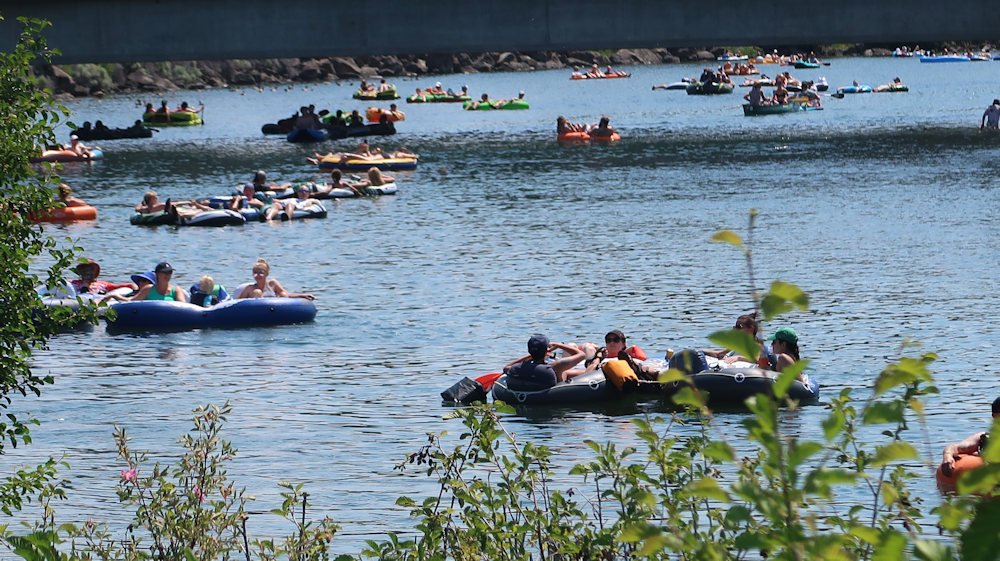Unprecedented: Northwest heat wave builds, records fall

Redmond, ties record not just for day or month, but since records began
PORTLAND, Ore. (AP) — Intense. Prolonged. Record-breaking. Unprecedented. Abnormal. Dangerous. That’s how the National Weather Service described the historic heat wave that is hitting the Pacific Northwest, pushing daytime temperatures into the triple digits and breaking all-time high temperature records in places where many residents don’t have air conditioning.
Portland, Oregon, reached 112 degrees Fahrenheit Sunday, smashing the all-time temperature record of 108 degrees, which was set just a day earlier.
In Central Oregon, Redmond Airport soared to 108 degrees Sunday afternoon, tying the all-time record set back on August 7, 1972. Bend broiled to 104, two degrees shy of its all-time high, set back on August 1, 1916. Though the official weather monitoring system and records are taken at the airport, other weather spotters in town did report 106-degree readings.
Madras, at 105, was just a degree below its all-time record set on August 5, 1998. Prineville hit 104, 15 degrees below the astounding record of 119 from way back on July 29, 1898.
Other high temperatures included 107 at Terrebonne, 105 at Sisters,
Numerous other cities broke records for the day and for the month, and some all-time records, including The Dalles, where it reached 115 degrees, and Hermiston, at 114, as well as several cities in Washington state. Eugene hit 111 degrees, breaking the 108-degree record set on August 9, 1981, for records kept back to 1892.
The temperature hit 104 F (40 C) in Seattle. The National Weather Service said that was an all-time record for the city better known for rain than heat.
It also is the first time for two consecutive days above 100 for the area since records began being kept in 1894.
It got so hot in Seattle that the city parks department closed a community pool in the southern portion of the city because of “unsafe, dangerous pool deck temperatures.”
King County closed several COVID-19 testing sites because of the heat. Seattle opened additional public library branches Sunday, and will again Monday, to provide additional cooling centers, The Seattle Times reported.
Seattle’s light rail trains may have to operate at reduced speeds because of excessive heat on the tracks, causing delays that could continue into the work week, Sound Transit said Sunday.
The heat wave also moved into Idaho, where temperatures above 100 F (38 C) are forecast in Boise for at least seven days starting Monday. Ontario, Oregon — a city near the Idaho border — could see at least a week of triple-digit temperatures, including a high of 109 F (42.8 C) Wednesday, forecasters said.
Cities were reminding residents where pools, splash pads and cooling centers were available and urging people to stay hydrated, check on their neighbors and avoid strenuous activities.
Still, about 3,000 athletes participated in an Ironman Triathlon in Coeur d’Alene, Idaho, on Sunday. The race start was moved up to 5 a.m. The event includes a 2.4-mile swim, a 112-mile bike ride and a 26.2-mile marathon run (a 3.9-kilometer swim, a 180-kilometer bike ride and a 42-kilometer run).
Race organizers said they had 62,000 pounds (28,000 kilograms) of ice at hydration stations, misting stations and chilled towels to hand out to athletes, KHQ-TV reported.
The Coeur d’Alene Fire Department brought in extra firefighters and paramedics because they usually see extra dehydration calls during the event. Rather than a crew of 17 firefighters, they had a crew of 60 on Sunday, KREM-TV reported.
Ironman medical tent coordinator Stan Foster said 525 people were in the medical tent during the 2015 Ironman, when temperatures also rose into the 100s. Five people went to the hospital, he told KREM-TV.
“The biggest thing that we tell people is, No. 1, don’t try to set a record on your race. Go slow. Enjoy your day. It’s going to be hot,” he said. “And then don’t just drink water.”
The National Weather Service in Coeur d’Alene said this week’s weather “will likely be one of the most extreme and prolonged heat waves in the recorded history of the Inland Northwest.”
The scorching weather was caused by an extended “heat dome” parked over the Pacific Northwest. Kristie Ebi, a professor at the University of Washington who studies global warming and its effects on public health, says the days-long heat wave was a taste of the future as climate change reshapes global weather patterns.
The high temperatures were forecast to move into western Montana beginning Monday.